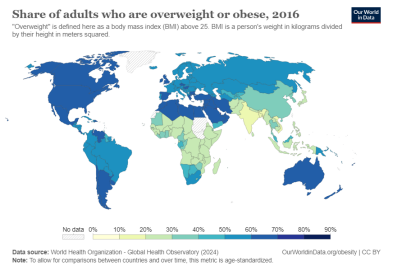
Epworth’s research within the pharmaceutical sector has recently focused on the introduction of ‘GLP-1’ drugs as a form of weight management. GLP-1 receptor agonists (drugs that mimic a hormone which regulates blood sugar and appetite) have emerged as a promising solution for weight loss alongside their established use within diabetes management. These drugs, including popular brands like Ozempic and Wegovy, have garnered considerable attention for their effectiveness in reducing body weight and improving metabolic health. However, as we at Epworth are aware, any medical intervention usually comes with both advantages and drawbacks.
The Bright Side
One of the most significant advantages of GLP-1 drugs is their potential to alleviate the burden on healthcare systems. As obesity rates continue to rise globally, with more than 2.5bn adults classed as ‘overweight’ and double the number of people classed as ‘obese’ since 1990, these medications offer a way to combat the epidemic and its associated health complications.

By promoting substantial weight loss through the regulation and suppression of appetite, GLP-1 agonists can help prevent or manage obesity-related illnesses such as type 2 diabetes, cardiovascular disease, and certain cancers. Moreover, the weight loss achieved through GLP-1 drugs can lead to increased mobility for individuals struggling with obesity. This improved physical function often translates to more active lifestyles, which can have a positive impact on mental health and overall well-being. Many patients report feeling more energetic and confident after a course of treatment with these medications.
The various benefits of these treatments are evident and represent a cause that Epworth is keen to further encourage through investment in companies producing these treatments, such as Novo Nordisk and Eli Lilly. Epworth believes these investments are firmly aligned with our ethical investment pillars, specifically ‘Health & Wellbeing’.

The Darker Side
Despite the multitude of benefits, GLP-1 drugs are not without controversy. One of the most pressing concerns is the issue of accessibility and cost. These medications are often expensive, making them out of reach for many lower-income households. Ironically, these are often the same communities that face higher rates of obesity due to limited access to healthy food options and reliance on cheaper, processed foods. This disparity in access to treatment could exacerbate existing health inequalities. For example, in the US, the National Healthcare Quality and Disparities Report found that almost 1/3 of low-income households lack health insurance, compared to less than 6% of higher-income households, and these lower-income households were more likely to experience chronic illnesses and overall poor health.
This is another issue we at Epworth actively seek to address and do so through our investment in companies which are producing medical equipment, creating efficiencies and providing capital to further expand healthcare capabilities and accessibility globally.
An additional ethical concern is the potential overreliance on medication to solve health problems. Critics argue that the widespread use of GLP-1 drugs might discourage people from adopting healthier lifestyles, instead promoting a "quick fix" mentality. This is particularly damaging as new research being conducted aims to highlight that GLP-1 drugs can also be used to treat substance addiction, the logic being that the same mechanisms that repress appetite also repress cravings for harmful substances. This approach may not address the root causes of obesity or addiction and could lead to long-term dependence on medication.
The growing popularity of GLP-1 drugs for weight loss has also led to supply shortages, affecting patients who rely on these medications for diabetes management. This off-label use raises questions about prioritising cosmetic weight loss over essential medical treatments.
Lastly, the rise of these drugs may have unintended social consequences. The recent progress made in body positivity movements could be undermined as more people pursue a "skinny" ideal through medication. This shift could potentially reinforce harmful beauty standards and stigmatise those who choose not to or cannot use these drugs.
Conclusion
GLP-1 drugs represent a significant advancement in the treatment of obesity and its related health issues. While they offer hope for many struggling with weight management and can potentially reduce the strain on healthcare systems, they also raise important ethical questions. Epworth is no stranger to the delicate balance of harnessing the benefits of innovation whilst confronting drawbacks, striving, as always, to prevent the creation of any form of inequality or stigma within society.
The opinions expressed in this note are not intended as investment advice and are based upon Epworth's views and projections at the time of writing. They may change at any time. If you are considering investing in any market, please consult an independent financial adviser or other professional adviser before making an investment decision. The value of investments and the income generated by them can fall at any time. The investment services and products offered by Epworth Investment Management Limited are not suitable for an investor if the possibility of capital losses or reduced income cannot be accepted. The past is no guarantee of future performance.
